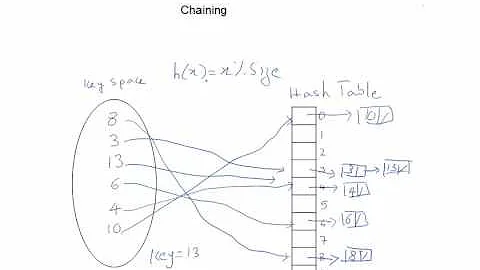Meaning of Open hashing and Closed hashing
Solution 1
The use of "closed" vs. "open" reflects whether or not we are locked in to using a certain position or data structure (this is an extremely vague description, but hopefully the rest helps).
For instance, the "open" in "open addressing" tells us the index (aka. address) at which an object will be stored in the hash table is not completely determined by its hash code. Instead, the index may vary depending on what's already in the hash table.
The "closed" in "closed hashing" refers to the fact that we never leave the hash table; every object is stored directly at an index in the hash table's internal array. Note that this is only possible by using some sort of open addressing strategy. This explains why "closed hashing" and "open addressing" are synonyms.
Contrast this with open hashing - in this strategy, none of the objects are actually stored in the hash table's array; instead once an object is hashed, it is stored in a list which is separate from the hash table's internal array. "open" refers to the freedom we get by leaving the hash table, and using a separate list. By the way, "separate list" hints at why open hashing is also known as "separate chaining".
In short, "closed" always refers to some sort of strict guarantee, like when we guarantee that objects are always stored directly within the hash table (closed hashing). Then, the opposite of "closed" is "open", so if you don't have such guarantees, the strategy is considered "open".
Solution 2
You have an array that is the "hash table".
In Open Hashing each cell in the array points to a list containg the collisions. The hashing has produced the same index for all items in the linked list.
In Closed Hashing you use only one array for everything. You store the collisions in the same array. The trick is to use some smart way to jump from collision to collision until you find what you want. And do this in a reproducible / deterministic way.
Solution 3
The name open addressing refers to the fact that the location ("address") of the element is not determined by its hash value. (This method is also called closed hashing).
In separate chaining, each bucket is independent, and has some sort of ADT (list, binary search trees, etc) of entries with the same index. In a good hash table, each bucket has zero or one entries, because we need operations of order O(1) for insert, search, etc.
This is a example of separate chaining using C++ with a simple hash function using mod operator (clearly, a bad hash function)
Related videos on Youtube
hareendra reddy
Updated on July 12, 2021Comments
-
hareendra reddy almost 3 years
Open Hashing (Separate Chaining):
In open hashing, keys are stored in linked lists attached to cells of a hash table.
Closed Hashing (Open Addressing):
In closed hashing, all keys are stored in the hash table itself without the use of linked lists.
I am unable to understand why they are called open, closed and Separate. Can some one explain it?
-
Mr. Suryaa Jha over 4 yearsActually we never store keys in hash tables, we take a tuple (Key, Value) and use the key to compute where the value should be stored. So actually we store the values in the Hash Table
-
-
rurban about 10 yearsWe should add that Open Hashing (Separate Chaining) is not restricted to linked lists, which are not cache friendly and denegerate on collision attacks to O(n/2) behaviour. You can also use trees or sorted arrays for the colliding buckets.
-
 Marwen Trabelsi over 5 yearsdownvote due the conflicting information: you said "open" and "closed are synonyms, then at the end : "the opposite of "closed" is "open"
Marwen Trabelsi over 5 yearsdownvote due the conflicting information: you said "open" and "closed are synonyms, then at the end : "the opposite of "closed" is "open" -
Ken Wayne VanderLinde over 5 years@MarwenTrabelsi I never said that "closed" and "open" are synonyms.
-
 Marwen Trabelsi over 5 years'This explains why "closed hashing" and "open addressing" are synonyms.'
Marwen Trabelsi over 5 years'This explains why "closed hashing" and "open addressing" are synonyms.' -
Ken Wayne VanderLinde over 5 yearsYes, "closed hashing" and "open addressing" are synonyms. That's not the same as saying "closed" and "open" are synonyms.
-
 Rahul Kadukar over 5 years@MarwenTrabelsi There is a difference between "Open Addressing" and "Open Hashing". in Ken's answer, he explains that "Open Addressing" and "Closed Hashing" are synonyms. Counter to that "Separate Chaining" and "Open Hashing" are synonyms.
Rahul Kadukar over 5 years@MarwenTrabelsi There is a difference between "Open Addressing" and "Open Hashing". in Ken's answer, he explains that "Open Addressing" and "Closed Hashing" are synonyms. Counter to that "Separate Chaining" and "Open Hashing" are synonyms. -
Santropedro almost 5 yearsCan someone provide a source proving this is the correct historical etymology?
-
DeadManProp over 3 yearsThank you. As a beginner, I find it particularly confusing when "open hashing" and "closed addressing" are synonyms, but so are "closed hashing" and "open addressing". In fact, there are some tutorials that confuse these terms and give incorrect information.







